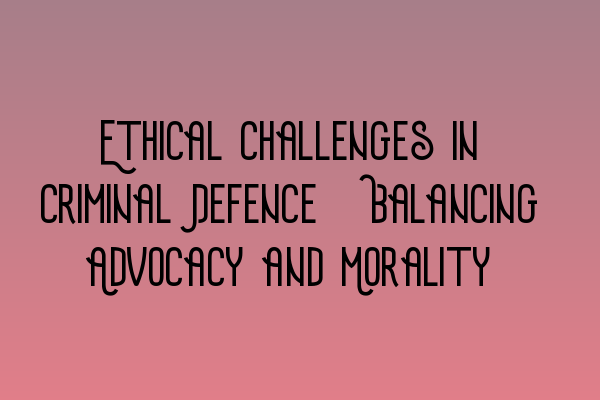Ethical Challenges in Criminal Defence: Balancing Advocacy and Morality
Welcome to the SQE Criminal Law & Practice Law UK blog! In this post, we will explore the ethical challenges faced by criminal defence solicitors and the delicate balance they must strike between advocacy and morality.
The Role of a Criminal Defence Solicitor
A criminal defence solicitor plays a crucial role in our justice system. They are responsible for providing legal representation and advice to individuals accused of committing criminal offences. Their primary duty is to act in the best interests of their clients, ensuring their rights are protected and that they receive a fair trial.
However, being a criminal defence solicitor is not without its ethical challenges. Advocating for a client’s interests may sometimes conflict with the solicitor’s personal moral compass. This creates a difficult balancing act that requires careful consideration and professional judgment.
The Conflict Between Advocacy and Morality
When defending a client, a solicitor is expected to act in their best interests, which includes challenging the prosecution, questioning witnesses, and presenting a strong defence. This zealous advocacy can sometimes clash with a solicitor’s personal beliefs about right and wrong.
For example, a solicitor may be asked to defend a client accused of a heinous crime. Despite personal feelings of repugnance towards the alleged actions, the solicitor must remember their duty to provide a robust defence and ensure the client receives a fair trial.
This conflict between advocacy and personal morality is one of the significant challenges faced by criminal defence solicitors. It requires them to separate their personal beliefs from their professional obligations and focus solely on the interests of their clients.
Professional Integrity and Ethical Obligations
To maintain professional integrity, criminal defence solicitors must adhere to a strict code of ethics. The Solicitors Regulation Authority (SRA) sets out guidelines that solicitors must follow to ensure they conduct themselves ethically and in the best interests of their clients.
One of the core principles of the SRA Code of Conduct is that solicitors must act with integrity. This means maintaining high ethical standards and placing the interests of clients above personal considerations.
However, it’s important to note that acting with integrity does not mean compromising personal morals. Solicitors must find a way to balance their advocacy role with ethical considerations, ensuring they act within the boundaries of the law while upholding their personal values.
Strategies for Balancing Advocacy and Morality
Successfully navigating the ethical challenges in criminal defence requires solicitors to develop strategies that allow them to fulfill their professional duties while addressing their personal moral concerns. Here are some key strategies:
- Objective Evaluation: Solicitors must objectively evaluate the evidence and potential consequences of their defence strategy. By focusing on the facts rather than personal biases, they can ensure their actions are guided by legal principles.
- Open Communication: Solicitors should have open and honest communication with their clients. By understanding their clients’ goals, beliefs, and concerns, solicitors can tailor their advocacy while staying within the bounds of legal and ethical obligations.
- Seeking Guidance: When faced with particularly challenging cases, solicitors can seek guidance from their peers, professional organizations, or legal experts. This can provide valuable perspectives and help solicitors make well-informed decisions.
- Continued Education: Continuous professional development and staying updated on legal precedents and developments can enhance a solicitor’s ability to navigate ethical dilemmas effectively. Training courses, such as SQE 2 Preparation Courses, can equip solicitors with the necessary knowledge and skills.
Conclusion
Being a criminal defence solicitor comes with numerous ethical challenges. Balancing advocacy and morality requires solicitors to act in their clients’ best interests while upholding professional integrity. By employing strategies such as objective evaluation, open communication, seeking guidance, and continued education, solicitors can navigate these challenges and provide effective legal representation.
